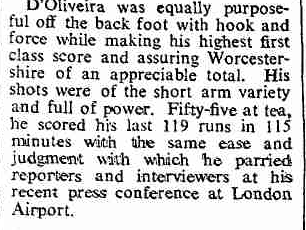“…three of the
nastiest cricketing days even the hardiest of watchers could remember” was how
John Woodcock summed up the experience of watching the opening match of the
Indians tour at Worcester. The rain that swept away most of the programme over
these three days would have come as a mercy to spectators, particularly those
at Harrogate who saw Alan Jones and Roger Davis of Glamorgan face 11 successive
maidens before the rain provided relief.
The only positive result was at Taunton where Hampshire
beat Somerset in contrived circumstances, reported by a disapproving Alan
Gibson.
The noteworthy thing here is that Gibson thought it
unusual; another twenty years on and negotiated targets had become the usual
way in which three-day games reached a definite conclusion
The outstanding cricket of these three days was provided
by two South Africans whose stories between them were to write much of the history
of English cricket over the next decade or so. Basil D’Oliveira had made his
test debut the previous summer, 15 years after he might have done but for South
Africa’s apartheid laws. Against the Indians he made the highest score of his
career at that point, reported by the freezing Woodcock.
Meanwhile at Hove Tony Greig made an entrance to the
County Championship that was as flamboyant and attention-grabbing as the rest
of his career was to be on and off the field, inspiring this anonymous reporter
to invoke Dexter, Fry and Ranjitsinhji (who he can't spell), all in two paragraphs:
I have made the point before that all the noise that
surrounded Greig over World Series Cricket, and which came out of his mouth as
a commentator, has obscured appreciation of what a wonderful player he was.
Here, he came in at 34 for three against an attack of Statham, Higgs and Lever,
England pacemen past, present and future and took them apart.
Nothing so exciting at Hesketh Park, Dartford, where Kent
laboured to 199 from 110 overs. And there was time for 28 more overs in the
Gloucestershire first innings on the first day before the rain washed away the
last two days.
Hesketh Park was the plain sister ground among the family
of Kent beauties. It staged 33 first-class games between 1956 and 1990. I saw
the last of these, against Leicestershire. It was an example of three-day
cricket at its best, a tense battle of the spinners that ended in a Kent win in
the last hour without the need for artifice. Yet the pitch was reported for
turning on the first day, proving that the game could no longer tolerate the imperfection
necessary for the three-day game to prosper.



No comments:
Post a Comment